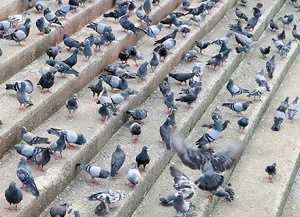NUISANCE BIRDS UK: The Wildlife and Countryside Act 1981 protects all wild birds in England.
That makes it an offence to harm or kill any protected bird unless you hold a valid licence for doing so. The same law also applies to pigeons.
Bird Protection Laws
Local police forces have the responsibility of enforcing the bird protection rules in the United Kingdom.
It is important to choose the right course of action to take. You must avoid harming or killing any wild bird species on purpose. Likewise, taking the eggs from wild bird species is illegal. Bird protection laws say you must not damage, disturb, or destroy bird nests.
Identifying Nuisance Birds
The first step to take with any bird problem is trying to identify what species of bird is causing the nuisance. Nuisance bird control has are several different approaches and solutions.
You will need a good bird book for research unless you are an expert ornithologist. Another expert resource is the Royal Society for the Protection of Birds website. The RSPB has a wealth of information about birds including an interactive bird identifier.
Find out more about bird wildlife laws and nature conservation:
The Royal Society for the Protection of Birds
RSPB Headquarters
Telephone: 01767 680551
Open Monday to Friday: 9am to 5.15pm
Dealing with Nuisance Birds (without harming them)
Dealing with nuisances caused by birds needs a wide range of different techniques. As a rule, nuisance bird control methods will include:
- Noise Deterrents: This usually involves the use of bird-like recordings or loud bangs. In most cases, it is best to use the alarm call of the species causing the problem.
- Food Restrictions: Make a point of cleaning up food spills in the outdoors. Always keep waste food and rubbish in a secure bin (not a plastic bag).
- Netting or Scarecrow: Using netting, a scarecrow, or bird-spikes does not harm the feathered friends per se. The ‘proofing‘ method helps to prevent them landing on, or gaining access to, specific areas. This is most effective in places where you know there are bird problems.
Nuisance Bird Proofing

The herring gull is a common nuisance bird in many areas around the United Kingdom. It is not uncommon to see these gulls nesting on rooftops making a deafening noise.
They become a real pest when they swoop down at people in the area. Nuisance bird proofing is a common solution for this type of aggravation.
Net the site before the gulls come back in the spring time to prevent a repetition of this problem.
The same kind of netting and spikes is also good to stop pigeons nesting and making their roosts.
Nuisance Bird Deterrent
The RSPB website provides specific advice on deterring certain bird species. They list methods for dealing with nuisance birds that people see as annoying pests.
In particular, they see bird problems caused by feral pigeons and urban gulls among the worst in the country.
Bird Problems: Avoid Feeding Nuisance Birds in Urban Areas
Avoid feeding problem wild birds in any open public urban area. Doing so makes them expect food scraps on a regular basis. It also encourages the birds to make swooping dives as they search for more food.
Swooping is perfectly natural for birds. But, it can scare some people, especially the aged. In fact, some large aggressive species such as gulls can – and do – cause injury. Feeding pigeons and waterfowl also increases the populations of these nuisance bird species.
Licence for Dealing with Nuisance Birds
These measures do not always solve every problem in the list of nuisance birds. Some of these measures are not lasting solutions to bird problems in the United Kingdom.
The law provides opportunities to take action that would usually be an offence. This ‘licensing‘ recognises that dealing with specific nuisance bird species requires drastic measures.
But, a nuisance bird licence is only available under certain restricted conditions. Two relevant licences used to get rid of nuisance bird problems relate to:
- Steps deemed necessary to protect public health and safety.
- The prevention of serious damage to farm crops, fruit, and vegetables.
Do Local Councils Deal with Nuisance Birds?
Most local councils will have limited ability for dealing with bird related problems. But, they may take action under a general licence to reduce feral pigeon or gull numbers. This happens most when it’s felt necessary to use for public health reasons.
Injured or Abandoned Birds
As a rule, the RSPB do not collect young or abandoned birds. Even so, they do offer advice about bid-related law and how to report a dead or injured animal. But, the advice is to leave fledglings where you found them.

